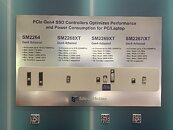
Xbox Announces Lower Pricing for Series X|S Storage Expansion Cards
Microsoft's official Xbox Twitter account has today announced that its official range of Xbox Series console storage expansion cards has been reduced in price: "Think of all the new games you'll be able to download and play now 👀. The Seagate Storage Expansion Card is now available starting at a lower price: xbx.lv/41e8t57." It is slightly odd that Seagate itself has not announced this lowering of gaming product MSRPs, but today's changes only affect the US market - European and UK listings feature the old prices (at the time of writing). It is not clear whether this discount is a permanent or temporary thing, but the latter is a more likely situation given rumors from last month.
It is very possible that Seagate is reacting to new competition - last month a Best Buy listing revealed that Western Digital is lining up to provide third party storage expansion cards for Xbox Series console owners. The leak of WD's incoming offerings indicated that it would be undercutting its arch rival in terms of pricing, at least with the single model that leaked (1 TB at $179.99) - Seagate has a timed exclusive agreement with Microsoft/Xbox for the licensed production/selling of proprietary cards. The officially sanctioned price drop brings the cards to more reasonable value levels, but Xbox owners have largely agreed that MSRPs were inflated from the beginning. The entry-level 512 GB Seagate model now costs $89.99 (a $50 reduction), the 1 TB model is now available at $149.99 (a $70 reduction) and the top-end 2 TB model gets the largest price slash (of $120) which brings it down to $279.99. Seagate appears to be undercutting WD's BLACK C50 1 TB model (if the Best Buy info leak price was accurate) by $30 with the official 1 TB storage expansion card.
It is very possible that Seagate is reacting to new competition - last month a Best Buy listing revealed that Western Digital is lining up to provide third party storage expansion cards for Xbox Series console owners. The leak of WD's incoming offerings indicated that it would be undercutting its arch rival in terms of pricing, at least with the single model that leaked (1 TB at $179.99) - Seagate has a timed exclusive agreement with Microsoft/Xbox for the licensed production/selling of proprietary cards. The officially sanctioned price drop brings the cards to more reasonable value levels, but Xbox owners have largely agreed that MSRPs were inflated from the beginning. The entry-level 512 GB Seagate model now costs $89.99 (a $50 reduction), the 1 TB model is now available at $149.99 (a $70 reduction) and the top-end 2 TB model gets the largest price slash (of $120) which brings it down to $279.99. Seagate appears to be undercutting WD's BLACK C50 1 TB model (if the Best Buy info leak price was accurate) by $30 with the official 1 TB storage expansion card.






























































